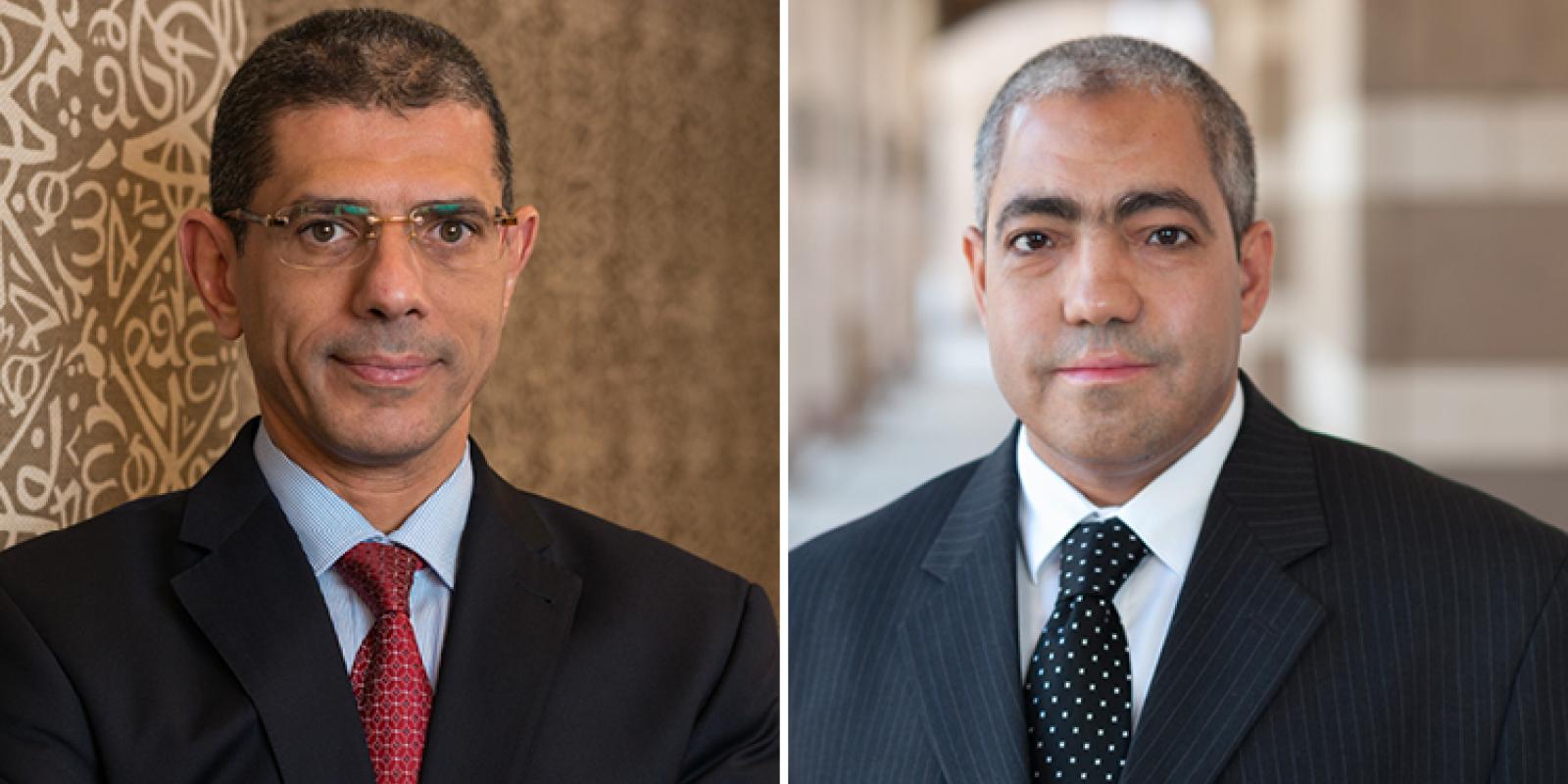
Sherif Sedky, Nageh Allam Receive Abdul Hameed Shoman Award for Arab Researchers
Provost Sherif Sedky and Associate Professor of Physics Nageh Allam have received the 2014 Abdul Hameed Shoman Award for Arab Researchers. The award is given out each year to academics in six fields of scientific research. Sedky received the award in engineering sciences, and Allam was honored in applied sciences.
“Having two of our faculty members receive such recognition is a testament to the top-caliber research conducted at AUC,” said President Lisa Anderson. “Building on a long and impressive research record here at AUC, Provost Sherif Sedky serves as a model of scientific dedication and creativity. Professor Nageh Allam, also an active and accomplished scientist, has made exceptional strides in his short career on a local, regional and global scale. They are both great examples of the type of faculty we have at AUC, embodying international excellence as they continue to push back the frontiers of science.”
Sedky recognized the significance of being honored by such an internationally respected institution. “This is a rather prestigious award,” he said. “It’s quite rewarding to see that my contributions to the development of my research field over the past decades are recognized and acknowledged.”
Allam also noted the importance of an institution that supports the scientific endeavors of Arab researchers in particular. “This is one of the most prestigious awards in the Arab world for early career scientists,” he said. “I feel that there are some people who truly care and can distinguish the efforts we make.”
Sedky, who served as founding academic president of the Zewail City of Science and Technology while on leave from AUC, before becoming the University’s provost, was honored by the Abdul Hameed Shoman Foundation for his contributions in developing and building smart systems. “Smart systems are tiny systems that can sense the various conditions of the environment and make a response accordingly,” explained Sedky. “It collects information from the surrounding environment. This information can be temperature, location, images of objects or vibrations. Then, according to the information collected, the system can give feedback to the control unit.”
Environmentally responsive smart systems have many practical applications, including the control of traffic lights and the flow of cars, elimination of excessive energy use, improvement of pacemakers and the pre-emptive detection of problems in building integrity. Furthermore, Sedky focuses on making these smart systems self-powered and sustainable. “Whether it is in buildings or in human bodies, it should generate the power it requires from the environment,” said Sedky.
Allam was chosen for his influential work in renewable energy. “My current research deals with the fabrication of nanostructured materials for use in functional devices such as solar cells, solar fuel, fuel cells and water desalination,” explained Allam, who is also developing and testing materials to build coronary stents, or tube-shaped devices that are placed in clogged arteries to allow blood flow to the heart. He is currently in the process of patenting the material, which will be instrumental in the treatment of coronary heart disease.
The foundation recognized the quality of Allam’s research, demonstrated by his patents and publications, as well as the recognition of his work both nationally and internationally.
Sedky also has an impressive body of work, including 13 patents and more than 100 published papers. However, what makes him notable as a scientist is the fact that his work reaches beyond the purely theoretical. “I did not only stop at the design of these systems, but have actually built the technological platform that allows these systems to be developed," said Sedky.
Sedky has built some of the first clean labs in Egypt, where young researchers can experiment and develop new smart systems. Two fully equipped clean labs were built at AUC, one at the Tahrir Square campus and a larger one at AUC New Cairo. He also established a sizeable lab and nanotechnology center at Zewail City to drive forward smart systems research at the newly founded institution.
Sedky emphasized the importance of having a space not only to build these smart systems, but also to expand his research with academics from other fields. “Being the provost here, I want to expand the concept of interdisciplinary study,” he affirmed. “This always generates new opportunities and ideas. And that’s also one of AUC’s main objectives.”
In addition to the recognition and support from the Abdul Hameed Shoman Foundation, Sedky is eager to advance his research with the AUC community. “My objective is to put more emphasis on getting people from various disciplines to work together, as this produces a lot of innovation,” he said. “In my field, you should work with medical doctors, with engineers, and with people from arts and social sciences.”
Moving forward, Allam is also looking to diversify his research by working within other disciplines. “I am currently doing my best to expand my research interests to include more applications besides renewable energy,” he said. “For example, I have just established a subgroup in water desalination in collaboration with Suez University to make use of our uniquely developed materials to desalinate seawater.”
Allam is also expecting to broaden his research in the medical field. He is leading a team that is investigating the bioactivity of materials and working to tailor new materials for biomedical applications, including fabricating wireless devices for neural and nervous systems.
In 1978, the Arab Bank set aside a portion of its profit to establish a foundation named after its founder, Abdul Hameed Shoman. The foundation focuses on uplifting Arab society by supporting scientific research and studies in the humanities. In addition to the award for Arab researchers, the foundation awards a prize each year to an Arab author of children’s literature, and provides funding for scientific research projects. In 1986, the foundation also established a modern library to make information easily available to researchers and the public. It is one of the leading computerized libraries in Jordan.
